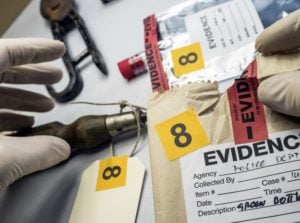
In the pursuit of a criminal case, evidence is the foundation upon which both sides build their respective arguments. During the investigation into a crime, great care must be taken to collect, preserve, and record evidence that could be critical in establishing the facts surrounding a criminal case. However, the importance of the evidence doesn’t end after the trial. As any good criminal defense lawyer knows, the evidence collected during a criminal case must be preserved for posterity to ensure that the due process rights of the accused are observed fully.
Preservation of evidence is important because it can impact the entire course of a criminal case and its influence can extend well beyond the initial resolution through the appeals process. The government has a duty to properly collect and preserve evidence in a criminal case to fulfill the obligations spelled out in the Sixth and Fourteenth Amendments to the Constitution. A criminal defense attorney in Anne Arundel County will go to great lengths to examine the evidence, as well as its collection and preservation, to make sure that the rights of the defendant are respected. Read on to learn more about the reasons that evidence preservation is critical in a criminal case.
Establishes Prosecution Arguments
Because the state and authorities in charge of investigating criminal cases will use the evidence collected during the investigation to establish key facts about the case, it’s critical that the evidence is collected correctly and in accordance with recognized standards. If the evidence wasn’t correctly collected and preserved, then its credibility is significantly damaged, and it may even be rendered inadmissible. A good defense attorney will question not only the credibility of the evidence, but the integrity of its collection and preservation. Failure to preserve evidence properly can lead to a mistrial or abandonment of charge against the accused since evidence is the basis of a prosecution case.
Establishes Defense Arguments
The evidence is equally as important to the defendant’s case in a criminal trial. First, a defense attorney can examine evidence assembled against the defendant and assault its credibility if it wasn’t properly collected and preserved. Also, because the defendant may have evidence to submit of an exculpatory nature that can be used to establish an alibi, it’s important that such evidence is preserved to protect its integrity as well.

Protects Due Process for Accused
Even if a criminal case has reached its initial resolution, the defendant has the right to an appeals process that could stretch on for a considerable time. Therefore, any evidence that could reasonably be important to the appeals process must also be preserved to ensure that it’s available for use in future legal proceedings to reach a just final disposition. Preservation of evidence is a key component in the due process rights of the accused and is, therefore, an integral component in the pursuit of justice in the legal system.
Can Be Used for Exoneration
There have been many cases in which evidence that initially proved damning to a defendant was later used to provide exoneration years later. For example, DNA evidence that couldn’t be tested in the past may be used to prove the innocence of a defendant years later. However, if that evidence isn’t properly preserved, it won’t be available and could result in an innocent person remaining incarcerated for crimes he or she didn’t commit.
In a criminal case, the evidence collected and presented is critical to both the prosecution and defense, and therefore, must be collected and preserved with the highest standards of integrity. To learn more about the importance of evidence preservation in a criminal case, contact Ortega Law, LLC at 410-650-8543.

